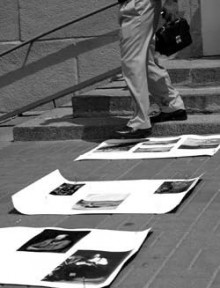You could hear nothing but the sound of hammers in front of the Podil Raion Council. A few people were nailing photos of paintings by well-known Ukrainian artists to the pavement, and a girl was speaking through a loudspeaker, calling upon all the officials to trample on the artworks.
The Trampled Art Action was organized by the OPORA Civic Network together with a group of Kyiv artists. This was how they chose to express their attitude to the city authorities’ decision to expel artists from the premises that they rent at 22a and 22b Andriivsky uzviz.
“We oppose the ‘Chinese cultural revolution’ in the heart of Kyiv,” the picketers said. “All these artistic achievements are being displayed right under the state officials’ feet, so that they can come out during their lunch break and openly trample on the art, not hide their desire behind their doors, and take refuge in the law.”
The artists have transmitted their demands to the authorities: to forbid the profile change of the premises on Andriivsky uzviz, which are being used for cultural-artistic purposes; to cancel last year’s decision and competitions that resulted in a change in the designated use of these premises; to grant special status to the premises that are used for artistic purposes; to publicize information on the competitions that were held in 2006-07; and to schedule competitions concerning the premises on Andriivsky uzviz on the official Web site of the Podil Raion State Administration.
After about an hour the head of the Podil administration, Yevhen Romanenko, came out to talk with the picketers. He responded to all questions asked by the demonstrators and journalists at the scene. Responding a question about the eviction of the artists from 22a Andriivsky uzviz, he said that this decision was passed in accordance with legislation, specifically by holding a competition, and that the tenants of the premises were given one month’s notice about their eviction.
This is how Romanenko answered a question put by well-known artist Viktor Kharmatov, “Where is morality?”: “The law is the law. It has nothing to do with morality.” His words sparked loud disapproval from the crowd, and Romanenko added: “Money is the competition’s main criterion. He who pays more gets the premises.”
There is no avoiding the conclusion that it is not economically profitable for the Kyiv municipal government to have Ukrainian artists living on Andriivsky uzviz, known as “the Kyiv Montmartre.” But the worst thing is that nearly all the capital’s cultural centers and artistic studios have become economically unprofitable in the eyes of the Kyiv authorities.
This question was discussed at a recent press conference organized by a group of Kyiv artists. Oleksii Bezhin, the rector of the Kyiv Karpenko- Kary National University of Theater, Cinema, and Television, declared that his institution cannot pay the rent for the premises of one hall at the university, which it has been renting since 1950, because Kyivzhytlospetsekspluatatsiia is always postponing the signing of a lease agreement.
The rental agreement for the specialized state Mystetstvo Publishing House, which has been our country’s leading art publishing house for 75 years, is also not being renewed. Part of this huge problem is the liquidation of studio dormitories for the National Bandurist Capella Choir of Ukraine, Virsky National Merited Academy Dance Ensemble of Ukraine, Veriovka National Merited Academy Ukrainian Choir, and other ensembles.
“We have been leasing a dormitory building on Tupolev Street,” Myroslav Vantukh, the art director of the Virsky National Merited Academy Dance Ensemble of Ukraine and Hero of Ukraine, says. “We kept paying the rent, carrying out repairs with money from the state budget and the students, but this year we received a notice that the lease term expires on Feb. 20, 2007. The department in charge of communal property, privatization, and business at the Shevchenko Raion Administration has refused to extend the rental agreement. Without providing reasons for the refusal, the administration issued an order to leave the premises within a 10-day period; in case of noncompliance, the department reserves the right to appeal to the courts for a notice of forcible eviction of 50 students who live in the art studios. But we are not going to resettle our students; we will struggle for a fair resolution of this question.”
After all is said and done, nobody knows what the artists will do. But the situation is becoming more acute. The Day will continue following the story as it develops.







